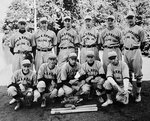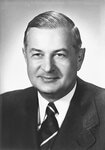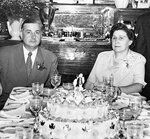BY MIKE LUNSFORD
hickory913@gmail.com
He was “deliberate” and “no-nonsense,” a chain-smoking steam engine who once told his receptionist, “I guess I’m not the vacation type.” Yet, to all who knew him, it came as a shock when Spencer Werner, President and principal owner of Illinois Cereal Mills in Paris, Illinois, died at age 65 of a heart attack in Chicago’s Bismarck Hotel; it was January 22, 1964.
Although Werner has been gone nearly 60 years, and memories of him have mostly faded, his influence is still being felt in this small Edgar County community, mostly through his grant-giving endowment, now known as the Lutheran Legacy Foundation. A generous and friendly man, he belied the typical image of a highly-fueled and competitive executive with a good-natured friendliness and benevolence that made him, above all else, memorable.
Werner was, as friend and employee Jim Buchanan says, “…very long-term oriented—he had a vision of the future, and people who worked for him were very loyal and always gave their best.” Now 90, Buchanan worked with Werner for four years as a “hedger,” a buyer of corn and corn futures in Chicago.
“It’s funny,” Buchanan adds, “because Spencer was very unusual. He had confidence in people who worked for him, and he didn’t second-guess you.
I recall one instance when I explained something to him, and then asked him, ‘What should we do?’ And, he said, ‘Don’t ask me; you do what you think is best.’ I had only been in the business for a few years, yet he already trusted me.”
Decades after first coming to Paris, his business acumen clearly paying off, Werner and his wife, Clara, established the Foundation, originally designed to fund projects and programs solely associated with the Lutheran Church; to date, it has donated some $50 million toward seminaries, church construction, a daycare center, senior housing, and scholarships. Werner’s rather general description of the Foundation’s goals, however, has left its board hopeful of
expanding its scope even more.
“The Clara and Spencer Werner Foundation continued as a private foundation until 2005 when it merged into the Lutheran Legacy Foundation as a donor-advised fund,” explains its managing director, Jerry Klug. “Grants have been given to diverse Lutheran organizations, but there seems to be an emphasis on education, and as we move into the future, that emphasis may take a more prominent role,” he adds.
It seems as if Werner was destined to be in the milling business. Born in Milwaukee in 1899 to second-generation German parents, he wrote in a small autobiography in 1958—the year he established the Foundation—that, “I don’t think you can classify me as a successful man. But whatever success I attained comes from the fact that I worked hard all my life.”
Work he did. Not only did he spend countless hours shooing flies from the horses in his father’s blacksmithing business, he was delivering newspapers by the time he was eight years old, giving that job up only to work with his uncle at the rather “messy and unpleasant” task of salting hides at 50 cents a week.
“There was no play for me,” Werner wrote, “for after supper, I had homework to do.”
Werner attended high school for only one full year, and it was during that time that he applied for an office boy’s position at Charles Krause Milling, a job that paid him an astounding $5 a week; that job gave him the practical experience and ambition for what he would do with the rest of his life. Werner was with Krause for 20 years; “I worked at every job in that organization,” he wrote. “I did not let the one year in high school be a handicap. I kept up with my education going to school at night, also business college and home study courses,” he added.
In 1934, and with two other investing partners in tow, Werner came to Paris and took over a mill that he described as “old and dilapidated,” yet also added, “…but hard work on the part of everyone soon rejuvenated [it] and we started operations.” It was during the difficulties of those Great Depression days that Werner apparently found his executive legs, openly negotiating with his workers’ union and delegating authority to his staff. After a devastating fire completely destroyed the mill on the night of September 10, 1946, Werner optimistically oversaw its rebuilding, despite his business partners selling out and the tenuous post-war economy. Years later, he started a profit-sharing and pension program well before most executives would have even considered it, and it was the employees who eventually purchased the mill, finally selling out to Cargill in 1995.
Werner’s financial reach also found its way into the lives and activities of numerous Paris residents and civic groups, and he and Clara were the driving force in the establishment of Grace Lutheran Church, which sits on South Main Street. In fact, just 11 days before his death, Werner, in his typically neat and flowing handwriting, jotted down a list of seven requests if, as he ironically wrote, “I go to the Happy Hunting Grounds.” Among the items were specific directions as to whom should take control of his business, and a stipulation that the Mill should always cast a kind eye toward his church. Later the Clara & Spencer Werner Foundation bylaws would specify Lutheran Churches and Charities.
Clara, who lived to 89, died in 1985, but enthusiastically continued her husband’s philanthropic ways to the very end. “At first, I couldn’t understand the pairing: Clara seemed to be so much the hausfrau [housewife] and Spencer so gregarious,” Chamber of Commerce President and Werner’s attorney, Bob Gibson once wrote, “but as I got to know her, I realized she was the perfect mate for him, and he for her.”
Interestingly, the Werner’s home on Crawford Street, sat at one time on the lot where the Paris High School gymnasium was built; it was cut into two pieces and moved to within a few blocks of the mill, Werner’s receptionist Mary Butler recalled in her reminiscences. “Now, at that time, they could have had any home they wanted, but they chose that one. They were always doing something to it—fixing this or changing that. But it was a nice, comfortable home, and they were just as happy there as if they had a mansion on a hill.”
Butler also recalled that Spencer’s personal generosity extended to her. At 21 she was trying to buy her own home, and in the months after the fire she worried about having a job and making her payments. “He called me in and told me, as he had all the others, that I would have to take a cut in pay, ‘but we’ll keep an escrow account, and when we get back on our feet we’ll pay everybody back. I know you are buying that house, and maybe it won’t be easy for you to take a cut. But if you’ll stay and you hit some financial difficulty, you let me know and we’ll work something out.’”
Harry Frost, 84, somewhat of a local legend through his involvement with Paris’ youngsters, came to the mill in the summer of 1960 as a chemist and was employed there for nearly 56 years. “He [Werner] would come [back] to Paris on Friday afternoon from his Chicago office and would go non-stop while he was here,” Frost says. “We salaried people all worked Saturday mornings and Spencer had a buzzer system connecting each office, and he would call individuals [in] for their Friday or Saturday morning meeting with him. When a person walked into his office, his first words were, ‘Tell me.’ We discussed our department and answered any question he might have. He was quick to make decisions, and his decisions seemed to always be on target.” Frost hopes to one day publish a history of the mill where he and his wife, Gladys (Werner’s personal secretary when he died), made a life together.
Both Frost and Buchanan also recalled that Christmas meant everything to Werner, who on a yearly basis lavished his office staff with gifts, mainly from Marshall Field’s massive Chicago department store. He usually had the store’s personal shoppers work from a list that he prepared himself, and each of his female employees would be given elaborately-wrapped gifts of clothing, while the men enjoyed at least four bottles of spirits. “I never drank scotch before,” Buchanan told me, “but Ballantine scotch spoiled me.”
In fact, Werner loved and planned for Christmas each year. Although he and Clara had no children, he spent hours hunting for exotic, unusual toys, which he gave to the children of many of his employees. Those who had no children received a generous number of books of green and TV stamps. Frost said that his first home was furnished with many items he and Gladys purchased with those stamps.
Daniel Briseno, former President of the Edgar County Historical Society, and now its Program Coordinator, says Werner’s contribution to the area went beyond financial support. “Spencer Werner was a man who loved not just his family at home but also his family at work. I believe that people should know that he knew every name of every employee he had, and not just the employees, but their families. He helped anyone that needed it. He was a giving man that never asked for anything in response except your hard work and dedication. The man never made a promise that he did not keep… He believed in Paris and the people of the community.”
That belief led to the creation of the Paris Lakers, a semi-professional baseball team that joined the Midwest League, but Werner also financially supported virtually every youth recreational league in town as well. It led to him organize donors to bail the town out of a failed fundraiser that eventually realized over $25,000 for Paris’s schools and clubs; it included memorably generous company picnics; and his faith in Paris also included his dream of a city-wide bus system, which never came about, but remained a goal that Werner would have almost certainly made happen.
In what had to have been one of his greatest acts of salesmanship, Werner convinced a friend at Pabst Brewing Company to donate funds for the largest of the many stained glass windows in his church. Typically, he was, even at his most charitable, a trader and a bit of a wheeler-dealer. “My devotion to God, family and country was always present…” he wrote in that too-brief life story of his.
But he also added, “At the other end of the scale, I’ve always had a sense of humor. I worked hard, it’s true, but I had fun doing it.”



